Environmental Justice Coordinating Council
EJCCEJCC Vision:
To eradicate environmental and economic injustices in north Minneapolis and beyond.
EJCC Mission:
The EJCC visualizes, creates and implements ecological, economic, and strategic investments to end environmental racism.
How We Began:
In 2017, Public Policy Project organized and created the Environmental Justice Coordinating Council (EJCC), composed entirely of African American residents and agents of change in North Minneapolis. With a grant, through Pillsbury United Communities, funded by the McKnight Foundation to develop an Environmental Justice Assessment and Action Plan for North Minneapolis. The EJCC meets monthly to develop and coordinate planning to reduce the environmental justice overburden in our community and increase both environmental and population health.
When we first asked African Americans in our community about how they see “environmental issues” in relation to the everyday racial and economic justice issues they focus on – people did not see a clear connection. After a series of one to one conversations and collective dialogues, people came to see that “all issues are environmental justice issues”.
The work of EJCC:
- Functions with the goal of sustainable and measurable improvement in the combined environmental and population health of Black and Brown Communities;
- Gathers and reviews existing data on environmental and population health in Black and Brown Communities;
- Develops a forward-looking analysis of this data, suggesting how this analysis will be applied to support increasing returns to environmental and population health;
- Produce a preliminary environmental justice action framework;
- incorporate an assessment of ecological literacy and engagement in the outdoor where Black and Brown call home;
- Design and implement a campaign to increase outdoor environmental engagement and to increase ecological literacy;
- Take concrete, measurable action to address the priorities of the environmental justice action framework. This might include engaging North Minneapolis residents in air, soil and water quality monitoring and remediation, analyzing brownfields and developing plans to generate an environmentally sound community development strategy to improve the quality of life.
- Connect to the broader network of mainstream environmental organizations and partner to advance career opportunities and both Board and staff leadership Roles of BIPOC communities in all environmental fields.
In addition, the EJCC convened quarterly dialogues with mainstream environmental organizations to partner around developing a career pathway strategy for more American Indians and people of color to connect to employment opportunities in environmental fields and advance into leadership roles in the field.
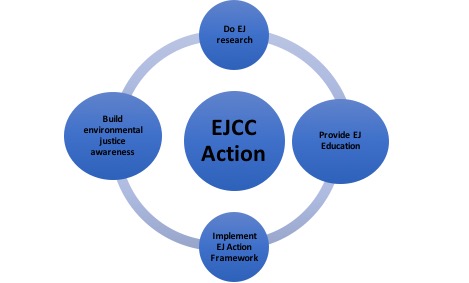
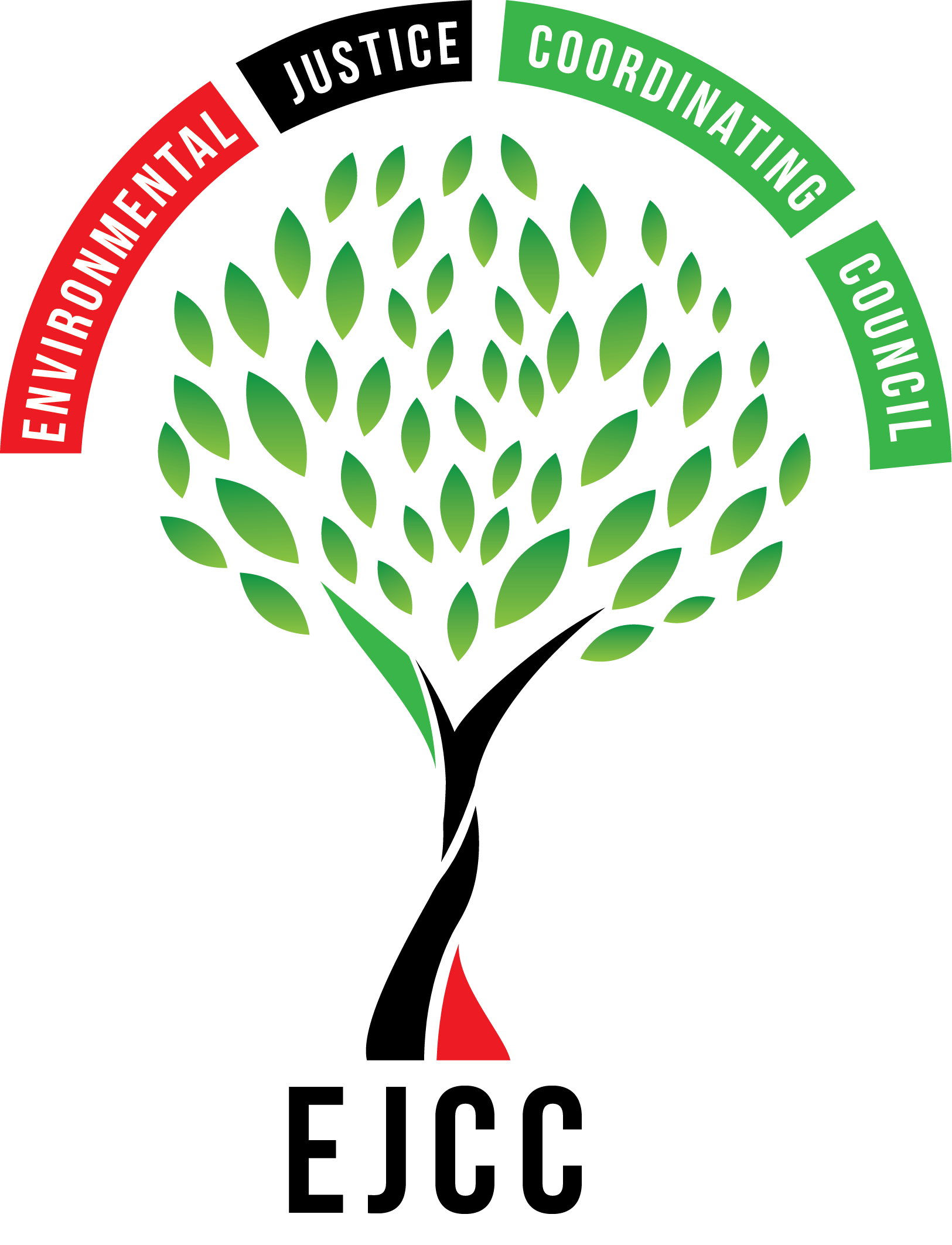
Current EJCC Fellows 2023-2024
St. Paul:
- Kartumu King
- Delora Lothenbach
- Damone Presley
- Wendell Ward
- Adia Hickman – youth 15-years old
Environmental Initiative Staff supporting the work of EJCC
- Tonya Draughn
- Bill Droessler
Minneapolis:
- Kennedy Pounds
- Tinitha ‘PEARLL’ Warren
- Moncies Franco
- Cecilia Calvo
Former EJCC Fellows who are now EJCC members and are working with EJCC on various projects::
- Jayda Pounds
- Hillary Thomas
- Ra ‘Essa As-Sidiq
EJCC Leadership & Participation
-
EJCC Fellows have taken a participatory leadership role on one or more of the following issues and groups
- Upper Harbor Development in north Minneapolis
- Minneapolis Green Zones Task Force
- Northern Medals Settlement Board. Formerly Northern Medals Advisory Council.
- COVID-19 Pandemic Community Support
- Police Community Relations after the murder of George Floyd
- Creation of the Environmental Justice Partnership
- Midwest Building Decarbonization Coalition
- Minnesota Department of Commerce – Community Energy Collaborative
- Clean Air Minnesota
- Input on the revamped MPCA Environmental Justice Advisory Council
- City of Minneapolis Emissions Reduction Cost Share program to businesses.
EJCC Activities and Events

The Environmental Justice Coordinating Council (EJCC) would like to invite the community to our second community event in a four-part Environmental Justice Series, The Planet We Live On: What’s in the Air We Breathe? on March 7th, 2024, from 6:00pm until 8:00pm at the Urban League Twin Cities, 2100 Plymouth Ave N, Minneapolis, MN 55411.
We want Black, Brown, and Indigenous communities in the twin-cities to understand what’s in the air we breathe, the sources of harmful ambient air emissions both outside and in-doors, and to leave the event with some actionable steps they can take to address air quality issues impacting them and ways they can connect with efforts of various environmental justice advocates and organizations fighting to decarbonize Minnesota.
Invited to speak at this community event include Minnesota Pollution Control Agency (MPCA), Frontline Communities Protection Coalition, Zero Burn/Zero Waste Coalition, BARR Engineering and the City of Minneapolis Public Health Department.
You don’t want to miss this important air quality event.
Please go to the QR code on the event flyer to register for the event.
If you have any questions, please email James Trice at: ppp.ejcc@gmail.com
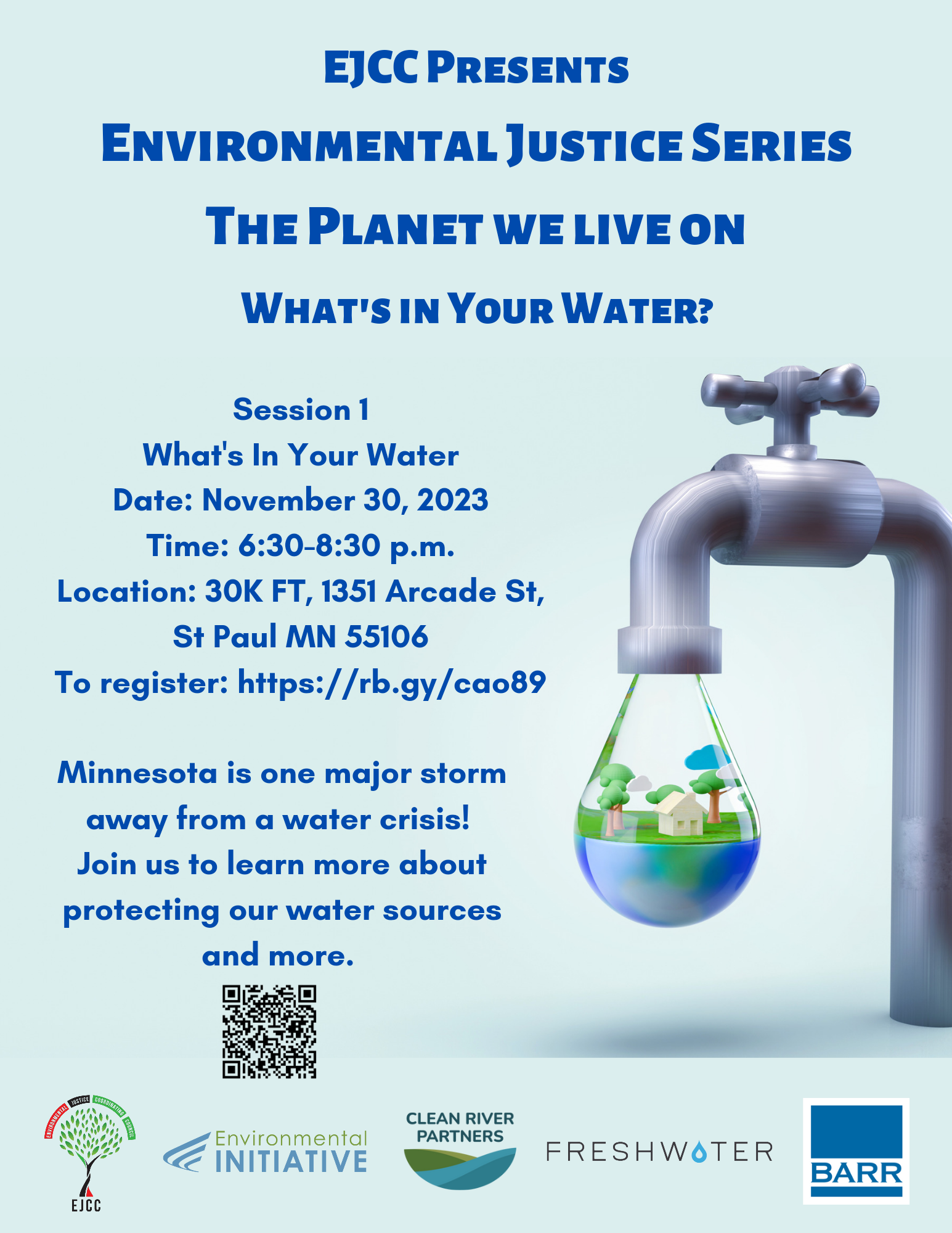
On November 30, 2023, the Environmental Justice Coordinating Council hosted our first community meeting in our environmental justice series “The Planet We Live On”. The meeting “What in Your Water?” was held on the east side of St Paul. The purpose of our meeting was to give the community a deeper understanding of their water quality, water safety, and the accessibility of clean and affordable water. More than 60 people attended including local environmental justice organizations and government institutions.
Attendees heard from Indigenous leaders about Native American’s history and connection to our local water systems.
Local water system experts, water justice advocates, and government agencies gave us lessons on water quality and our local water systems.
Staff from St Thomas University spoke on PFAS. St Paul Regional Water Services presented on water systems and treatment and gave us some action steps to take for our residences. Clean River Partners and Fresh Water gave us a presentation on the MN State Drinking Water Plan and gave the audience a chance to participate in the state’s survey on drinking water.
EJCC Fellows gave a presentation on their experiences attending the 2023 One Water Summit in Arizona. They spoke on the importance of having a summit on water but also the importance of having a community voice present, especially impacted communities, and communities of color, at these events. Our youngest fellow, Adia Hickman, gave a youth voice to the summit experience and the information she learned.
For our closing, participants were given steps residents can take to make our water more safe, accessible, and affordable. The action steps covered actions that families can do as individuals and as a household, steps a community can take, and steps that can be taken on a legislative level.
Most of our audience was from St Paul, and either were invited by a fellow or heard about our event through our social media and the social media of our partners. The age of participants ranged from youth ages 12+ to senior citizens.
The event was sponsored by:
Fresh Water
Barr Engineering
Environmental initiative
Clean River Partners
The next community event is March 7th, 2024.
EJCC Fellows attended the US Water Alliance One Water Summit 2023 in Tucson, AZ

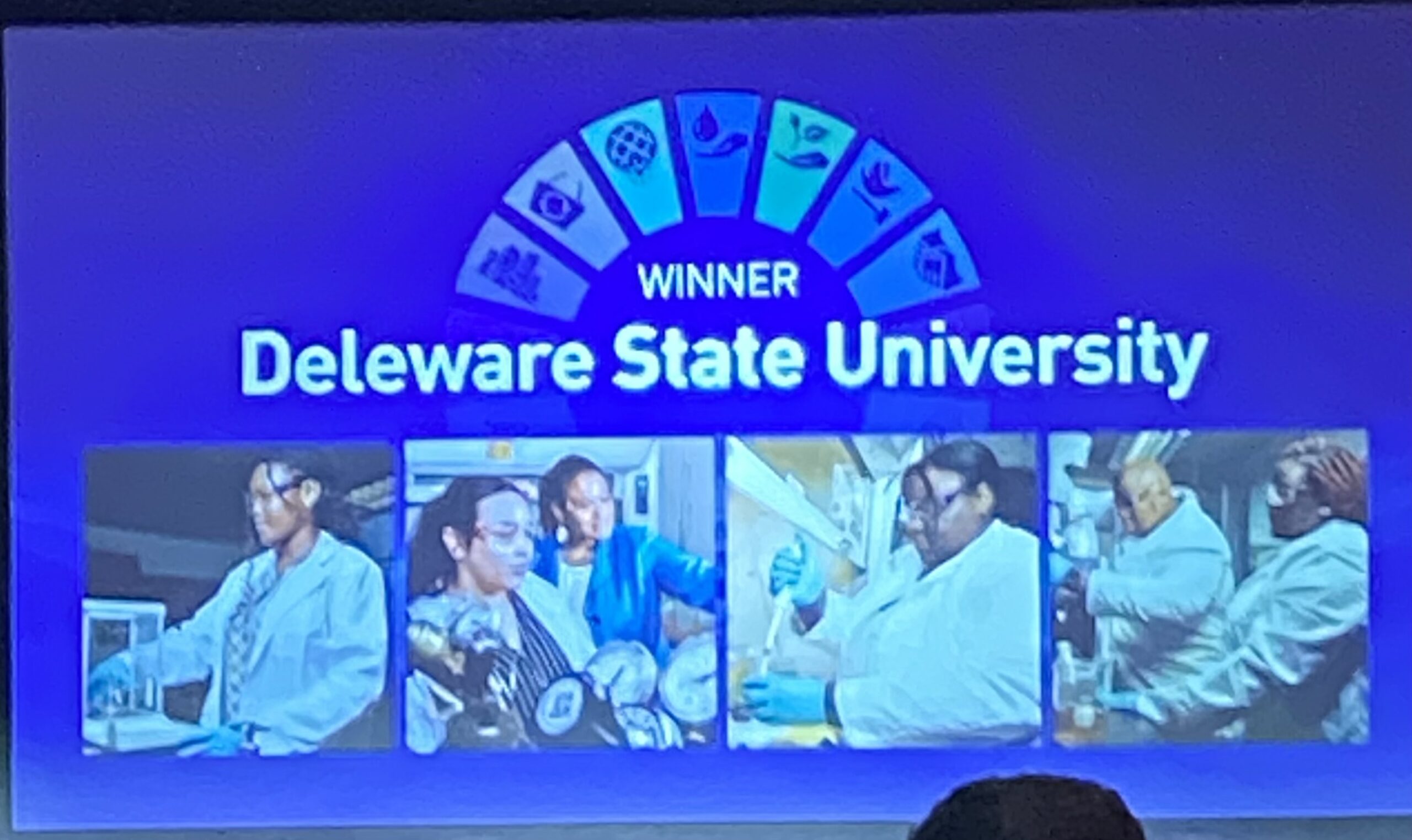
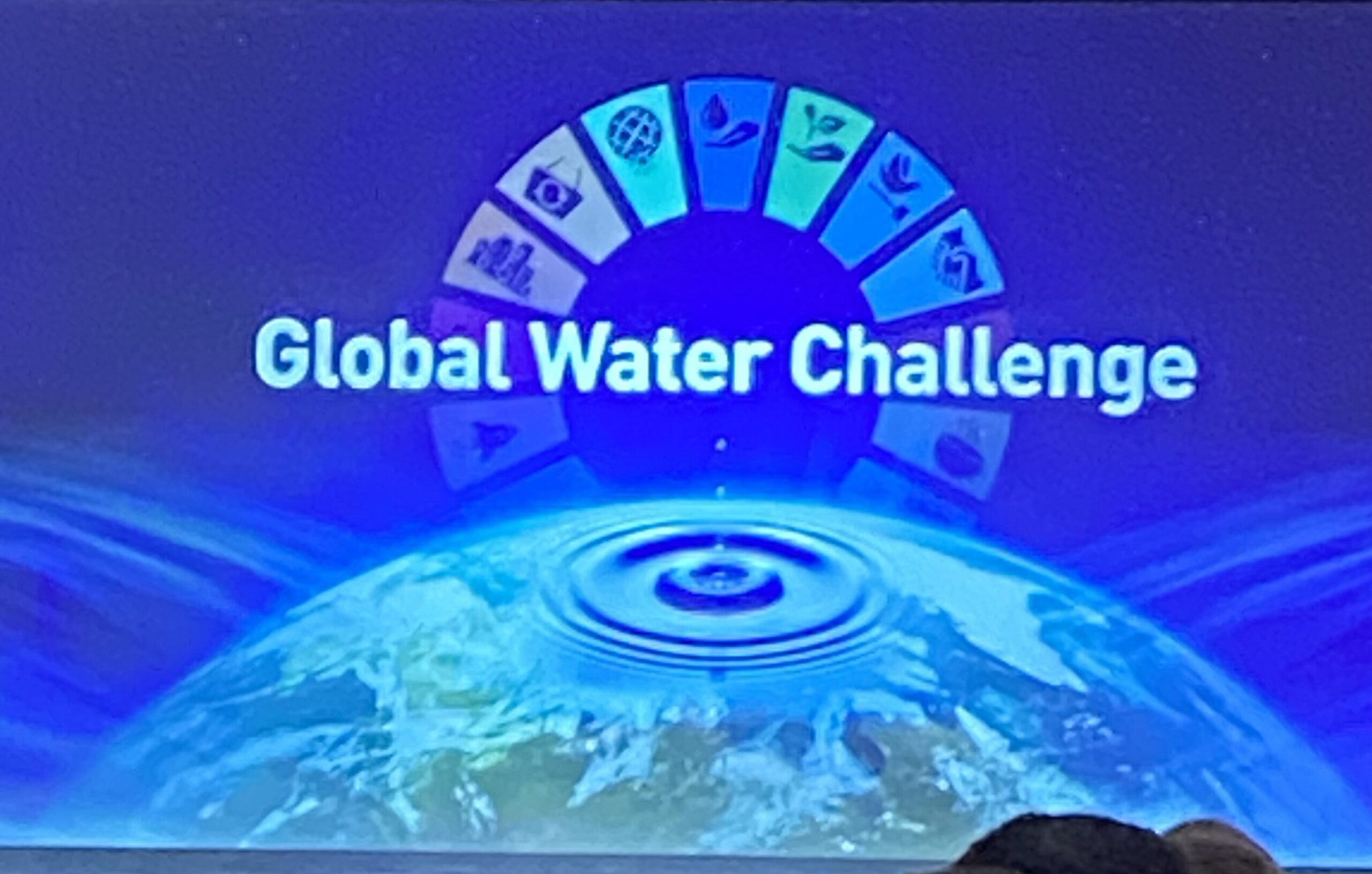
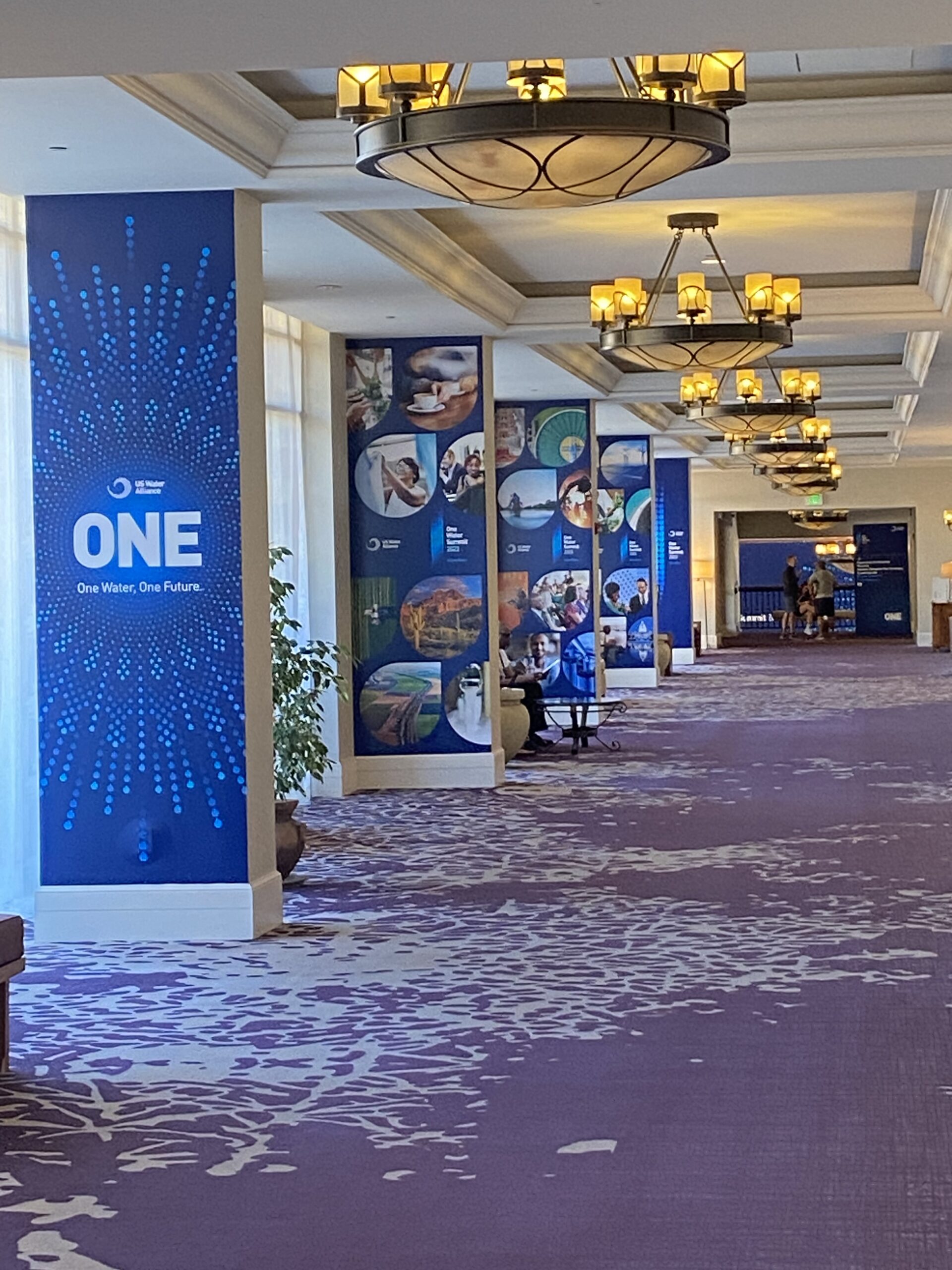
During the US Water Prize Ceremony and Celebratory Reception, the US Water Alliance presented awards to groups around the country for their outstanding work. Of all the awards given, we were most curious about the four students at Delaware State University (HBCU) Water Quality Lab Hemp Analysis Laboratory who received the Global Water Challenge award for their research in using Hemp to remove PFAS from water. We will be meeting with Dr. Kimberly Milligan, Associate Professor in the Department of Chemistry and Director of DSU Water Quality Lab Hemp Analysis Laboratory and the four students soon to learn more.
History of EJCC Fellows work:
The first group of EJCC Fellows (17 members), formed in November 2017, achieved the following outcomes:
- The EJCC played the lead role in establishing the Northern Metals Advisory Council on which 1 EJCC member sits. The NMAC, through a series of ten stakeholder meetings we facilitated, determined how to allocate funds from the Northern Metals Consent Decree (a metal shredder violating pollution standards) to address lead poisoning and asthma triggers.
- The EJCC played the lead role in generating the authorizing resolution for a North Minneapolis Green Zone Task Force, on which 5 EJCC members sit. The GZTF developed twelve objectives and is now acting upon 6 priority areas.
- The EJCC played a lead role in establishing the Environmental Justice Partnership, which bridges mainstream environmental NGOs across Minnesota with environmental justice communities. The EJP brought organizations together with environmental justice leaders to consider actions to advance finance, policy, shared leadership, and results in environmental justice across Minnesota.
- The EJCC also played a key role as a catalyst for a different model of development occur on the Upper Harbor Terminal – a 48.8-acre site in our community offering a once in a generation opportunity for a major –scale tipping point caliber development initiative that could positively or negatively impact the future of our community.
In these four areas above, the EJCC has centered the perspectives of African American community residents, challenged mainstream perspectives on policy and practice, and acted as catalysts for different ways of considering and addressing environmental and population health.
EJCC agrees with the following Definitions of Environmental Justice:
Environmental justice is the fair treatment and meaningful involvement of all people regardless of race, color, national origin, or income, with respect to the development, implementation, and enforcement of environmental laws, regulations, and policies. –U.S. Environmental Protection Agency (EPA)
“Fair treatment means that no population, due to policy or economic disempowerment, is forced to bear a disproportionate share of the negative human health or environmental impacts of pollution or environmental consequences resulting from industrial, municipal, and commercial operations or the execution of federal, state, local and tribal programs and policies.” -EPA
“All people and communities are entitled to equal protection of environmental and public health laws and regulations.” -Robert Bullard
“The environment is everything: where we live, play, go to school, as well as the physical and natural world. And so, we can’t separate the physical environment from the cultural environment. We have to talk about making sure that justice is integrated throughout all of the stuff that we do.” -Robert Bullard
“EJ the principal that all people and communities are entitled to equal protection of environmental and public health laws and regulations.” Robert Bullard
Environmental racism refers to any policy, practice, or directive that differentially affects or disadvantages (whether intended or unintended) individuals, groups, or communities based on race or color.” -Benjamin Chavis 1982
Environmental Justice Partnership:
One of the many achievements of PPP/EJCC is the establishment of the Environmental Justice Partnership (EJP), which bridges mainstream environmental NGOs across Minnesota with environmental justice communities. The EJP brought organizations together with environmental justice leaders to consider actions to advance finance, policy, shared leadership, and results in environmental justice across Minnesota.
The purpose of the Environmental Justice Partnership (EJP), catalyzed by the McKnight Foundation, was developed to generate a powerful statewide coalition of stakeholders to:
- Work in partnership with communities to lift up and resource Environmental Justice work with place-based communities and Native Nations being the core foundation for which we build, stand, and give voice.
- Bring sectors together to build relationships, explore, commit to, and embark upon shared work resulting in environmental justice and improved environmental health in all communities.
- Create change in the current structure and composition in the environmental movement and mainstream environmental organizations (MEOs) in order to honor the full intersectionality of ‘the environment’, and ‘environmental issues’, which include ALL issues.
Since the creation of EJCC in north Minneapolis and the EJP, Public Policy Project has been asked to establish similar EJCC groups in communities across Minnesota and around the country to work in partnership with MEO’s.
Public Policy Project/EJCC has recently partnered with Environmental Initiative to meet the following needs for the EJP:
- People have been doing environmental justice work for generations across the nation, in black and brown communities, tribal communities, and in Minnesota; however, the environmental justice community is under-resourced and black people, people of color and indigenous people need to lead the work locally, statewide and nationally.
- We define “mainstream environmental organizations” as those that have been historically led by white people versus led by those who live in communities directly impacted; focus on traditional environmental problems like land, water and air; and have privileged connections and relationships with funders and decision makers. Many traditional, mainstream environmental organizations reinforce ecological apartheid by failing to lead from a broader definition of ‘the environment’, and failing to deeply partner with environmental justice communities to promote an ecologically wise and just environmental movement.
- We face daunting challenges related to the way we care for the natural world and the things we share. We also have gaping disparities in the distribution of wealth, power, and opportunity that result in gaping health disparities, injustice, suffering and conflict. These critical challenges overlap, intertwine and are urgent. It is critical to address these challenges with an appreciative approach that starts with the honoring, full engagement from, and leadership by environmental justice communities across Minnesota.
